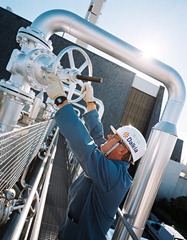Energy performance contracting: Could it work for you?
 Dalkia explains how the system is helping clients to save money and manage their performance.
Dalkia explains how the system is helping clients to save money and manage their performance.
Energy Performance Contracts (EPCs) have become a key feature of energy efficiency programmes over the last few years and are yet becoming ever more popular.
>An important part of every energy efficiency programme such as an EPC is an effective energy metering system.
In 2011, Dalkia delivered annual energy savings of €342,000 against a baseline of €870,000 on a client’s industrial site. These savings came as a result of investment in energy efficient utility production equipment and our ongoing operation and maintenance service provision. From a carbon perspective, total emissions savings of 2,003 tonnes of CO2 are being experienced annually.
At the heart of these savings is the detailed design and data gathering phase that took place in order to correctly specify the installations which are now delivering significant energy cost, consumption and carbon savings for the site.
Over 27 separate flow meters, pressure sensors and temperature sensors were installed on the site with the purpose of identifying what the respective loads were, what efficiencies were being achieved by the production facilities and also how much the utilities were costing the site. These meters were connected into data loggers where the metering interval was set to one minute. This set-up gave Dalkia and the client large quantities of detailed data to analyse and establish a baseline performance.
Once analysed, the data was used to create detailed compressed air, cooling and steam equipment specifications which were then sent out to tender. By knowing what the site utility requirements were in detail, the equipment is now optimised to deliver the quality and quantity of energy in the most energy efficient manner. For example, glycol water production COP (Coefficient On Performance) has increased from 1.02 to an average of 3.34, and compressed air production has increased from 4.9 Nm3/kWh to 10.1 Nm3/kWh.
These improvements in efficiency could not have been achieved without the respective energy data initially being gathered. It was the decision to invest capital in detailed metering and to take the time to analyse the data accurately which led to the significant and sustained energy savings onsite.
Financing
Energy services companies (ESCOs) such as Dalkia play a major role in bringing energy projects to fruition for private and public sectors establishments, that otherwise may not succeed through a shortage of self-financed capital or grant-supported funding. Given the current economic climate, the source of funding for these projects nowadays is unlikely to come directly from the ESCO, but through third party financiers. These agreements can be established either between the third party financier and the client or between the third party financier and the ESCO. Research on availability of capital for energy projects show that financial institutions are willing to lend money for investment in energy projects as long as the projects are viable, the lending term is sufficiently long enough (e.g. 10 or more years) and the project incorporates an EPC between the client and an ESCO.
When engaging with an ESCO under an EPC, the service or equipment provider (i.e. the ESCO), is paid fully or partially on the basis of said service and the associated equipment’s performance. For example, while the client might always have to pay for basic operational and maintenance service fees for the energy saving equipment installed by an ESCO, a percentage of that fee could be subject to a risk and reward scheme that would be linked to the success of achieving agreed targets for energy efficiency and savings.
This can also ultimately act as an incentive for the ESCO to continue to seek out further opportunities for savings above and beyond the initial scope of the EPC. For example, the associated cost savings (delivered through projects that the ESCO may identify and are subsequently implemented) could be shared between the ESCO and the client, with of course the long-term benefits of the project remaining with the client.
Dalkia currently operates several energy performance contracts with public and private clients in Northern Ireland and the Republic across the healthcare, educational, industrial and food and beverage sectors.
 For further information on how you can benefit from EPC, contact our General Manager today: Tony Doherty
For further information on how you can benefit from EPC, contact our General Manager today: Tony Doherty
Tel: +44 (0) 787 903 6270
email infoni@dalkia.co.uk





